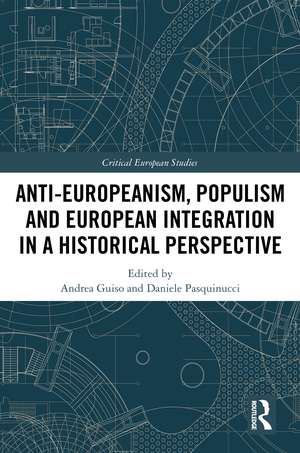Anti-Europeanism, Populism and European Integration in a Historical Perspective: Critical European Studies
Editat de Andrea Guiso, Daniele Pasquinuccien Limba Engleză Hardback – 14 iun 2024
Taking a historical perspective to move beyond explaining present-day expressions of opposition to the European Union in isolation, this book reveals the historical sedimentation of the several ways and forms taken over decades by opposition towards European integration. As such, this approach – with contributions from across disciplines - explains not just the past of Euroscepticism, but also its current nature and future prospects.
This book will be of key interest to scholars and students of European History, European Politics and Studies and more broadly to Political Science, International Relations, the Humanities and Social Sciences.
Preț: 1000.27 lei
Preț vechi: 1219.84 lei
-18% Nou
Puncte Express: 1500
Preț estimativ în valută:
191.43€ • 199.11$ • 158.03£
191.43€ • 199.11$ • 158.03£
Carte tipărită la comandă
Livrare economică 14-28 aprilie
Preluare comenzi: 021 569.72.76
Specificații
ISBN-13: 9781032444451
ISBN-10: 1032444452
Pagini: 248
Ilustrații: 10
Dimensiuni: 156 x 234 x 16 mm
Greutate: 0.45 kg
Ediția:1
Editura: Taylor & Francis
Colecția Routledge
Seria Critical European Studies
Locul publicării:Oxford, United Kingdom
ISBN-10: 1032444452
Pagini: 248
Ilustrații: 10
Dimensiuni: 156 x 234 x 16 mm
Greutate: 0.45 kg
Ediția:1
Editura: Taylor & Francis
Colecția Routledge
Seria Critical European Studies
Locul publicării:Oxford, United Kingdom
Public țintă
Postgraduate and Undergraduate AdvancedCuprins
Introduction - Contesting Europe: The Origins of Populist anti-Europeanism Part 1: Historicizing Populist Euroscepticism 1. Distinct but Converging: Historicising Populist Euroscepticism 2. European Integration and Democratic Legitimacy: A Historical Assessment of the Institutional and Economic Roots of Populist Euroscepticism 3. Euroscepticism from a Historical Viewpoint: The Need for Further Definition and a Brief Periodisation Part 2: The Historical Roots of Brexit 4. British Nationalism and Brexit 5. Populism and Euroscepticism: The UK Labour Party since 1945 6. Brexit and Margaret Thatcher’s Eurosceptic legacy Part 3: France and Germany: The old couple in the face of Populist Euroscepticism 7. The French Communist Party facing the European Defense Community (1950-1954): Between Propaganda, Ideology and Populism 8. From “Front” to “Rassemblement National”: Radical Right Populist Euroscepticism in France 9. Something new on the German front: The Alternative für Deutschland and Europe Part 4: National Varieties of Populist Euroscepticism 10. The construction of a Dutch Eurosceptic tradition by contemporary populist political parties 11. Euroscepticism and Vox: Is it the End of Spanish Exceptionalism? 12. “Against the Hegemony of Brussels”: The Anti-Europeanism of Right-Wing Political Parties in Poland 13. Following the benefits: Utilitarian attitudes towards the European Union: Evidence from three Central and Eastern European countries Part 5: Italy and Europe: From consensus to disenchantment 14. Between old-style nationalism and political realism: Italy’s diplomatic Resistance to the Process of European Integration between 1945 and 1957 15. Is the lira to blame? The European monetary “Snake” and the Emergence of Italian anti-Europeanism 16. Populism and Euroscepticism in Italy: Outlining the historical roots of a long-standing interplay 17. Populism, populists, European Democracies and European Union: The Italian case
Notă biografică
Andrea Guiso is a Full Professor of Contemporary History at the Department of Communication and Social Research, Sapienza University of Rome, Italy.
Daniele Pasquinucci is a Full Professor of History of International Relations and Jean Monnet Chair in History of European integration at the Department of Social, Political and Cognitive Sciences of the University of Siena, Italy.
Daniele Pasquinucci is a Full Professor of History of International Relations and Jean Monnet Chair in History of European integration at the Department of Social, Political and Cognitive Sciences of the University of Siena, Italy.
Descriere
This book explores the long-term origins of populist Euroscepticism.















